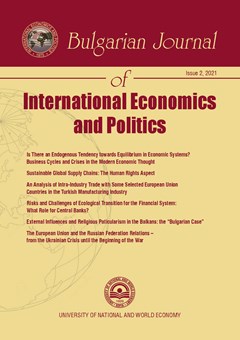Is There an Endogenous Tendency towards Equilibrium in Economic Systems? Business Cycles and Crises in the Modern Economic Thought
Is There an Endogenous Tendency towards Equilibrium in Economic Systems? Business Cycles and Crises in the Modern Economic Thought
Author(s): Giovanni PavanelliSubject(s): Politics, History, Economy, Business Economy / Management, Economic history, History of ideas, Economic policy
Published by: Университет за национално и световно стопанство (УНСС)
Keywords: business cycles; crises; Say’s Law; Hyman Minsky; Wesley C. Mitchell; New Classical Economics; real business cycles
Summary/Abstract: This paper critically examines the models of economic crises and business cycles devised by leading economists from the nineteenth century to the present day in the light of the current reflections on the limits of the so-called ‘mainstream’ theory. To this end, the article analyses the point of view of the classical authors (J.B. Say, Ricardo, Malthus and Sismondi) and the first analyses of crises in terms of business cycles (Tooke, Juglar, Jevons). It discusses then Tugan-Baranovsky and Arthur Spiethoff models, Wesley C. Mitchell contribution and the monetary explanations of the cycles during the 1920s (R.G. Hawtrey and Irving Fisher). It then examines the main interpretative models of cycles and crises during the 1930s: L. Mises and F. Hayek models, Irving Fisher’s Debt-deflation theory and Keynes contribution. The econometric approach of Frisch and Tinbergen and the ‘real business cycles’ model are then presented, as well as the ‘heterodox’ approach of Hyman Minsky. A main interpretative line of this paper is to maintain that, in spite of its complex taxonomy, modern analysis on business cycles and crises draws inspiration from two distinct methodological approaches that reflect radically different visions of how market economies actually work. The ‘majority’ view is the one shared by most marginalist and neoclassical authors and by the ‘New Classical Economists’. According to them, economic systems are intrinsically stable and tend to converge towards equilibrium. Fluctuations are caused by exogenous shocks bound to be reabsorbed quickly. Contrary to this view, two research approaches are identified having in common a marked attention to the institutional context. On the one hand, the contributions of Schumpeter and, to some extent, Mitchell who shared the belief that fluctuations should be studied with reference to a specific historical context. On the other hand, the analysis of J.M. Keynes and H. Minsky who believe that economic systems are potentially unstable, full employment cannot be taken for granted and appropriate policy measures are needed.
Journal: Bulgarian Journal of International Economics and Politics
- Issue Year: 1/2021
- Issue No: 2
- Page Range: 3-19
- Page Count: 17
- Language: English

